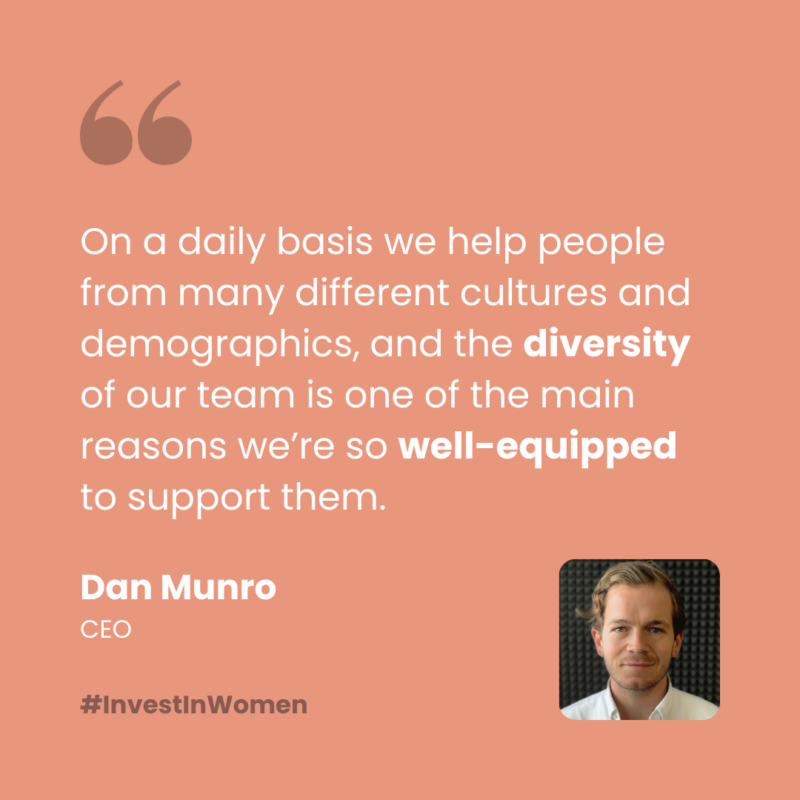The theme for this year’s International Women’s Day is Invest in Women: Accelerate Progress. We aim to do both here at Please Connect Me, and we wanted to share thoughts from some of our team about the value of supporting women in the workplace.
So, we asked our team some questions on what it means to invest in women, what their employer’s investment has meant for them and the value of promoting diversity, equity and inclusion in the workplace.
The PCM team include:
- Rebecca: Connections Expert
- Elizabeth: Sales Team Leader
- Bryn: Connectivity Manager
- Kat: Administration Manager
- Janis: Marketing manager
- Erin: Content Editor
- Dan: CEO
What has your company done to help you feel supported?
Kat: Please Connect Me supported me in my pursuit of additional learning opportunities to help me progress in my HR career.
On top of this, remote working (fully remote for nearly a year now!) has given me the opportunity to pursue my hobbies and interests by cutting time spent commuting, which has helped me achieve a suitable work-life balance. I see flexible working arrangements as a great way to support employees’ individual needs.
Rebecca: They’ve made me feel heard in my opinions and ideas. We work together equally in order to have a fun and professional workplace.
Erin: Starting from an entry-level position, the fact that the company had women in positions of authority across different teams made me feel supported in the opportunity to grow with the business. Now I’m more involved in project planning and operations I feel confident in sharing my ideas and feedback.
Elizabeth: Please Connect Me has built a supporting place to work in which the company cares about and supports its employees while also encouraging them to grow. All members of the team genuinely help and look out for each other. We are always able to reach out to ask about anything!
Janis: Having a team of capable, supportive women around me in the workplace has had a huge impact on my career and productivity. With their support, I’m not afraid to speak my mind or point out when something isn’t right. I’m also incredibly pleased to see more women taking on leadership roles within the company in recent years.
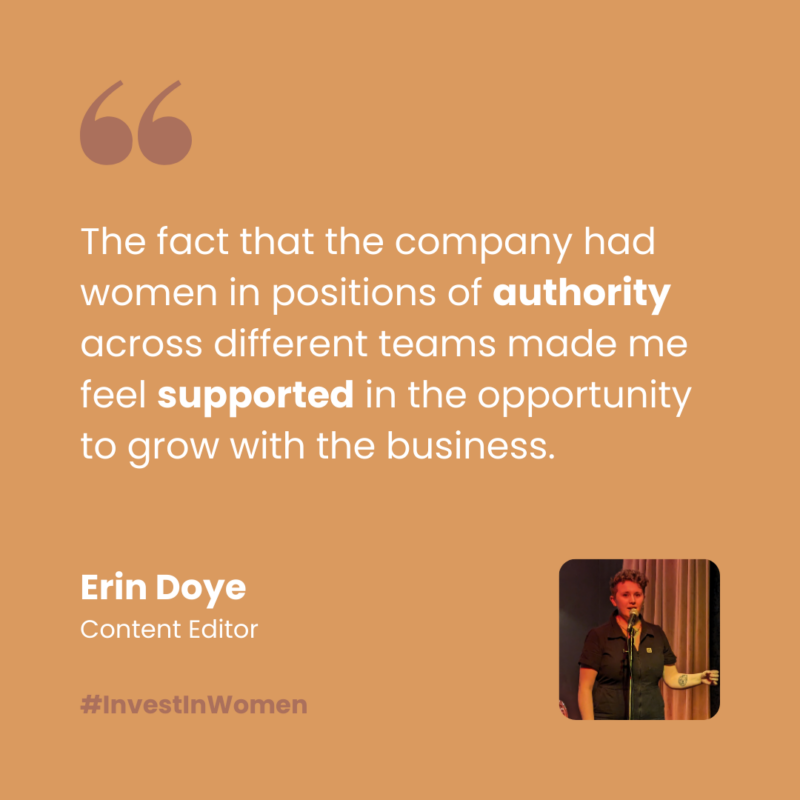
What are the strengths of a diverse workplace?
Kat: There is both a strong moral as well as a business case for creating a diverse workplace. A diverse workplace is paramount in achieving an environment in which everyone feels empowered to share thoughts and opinions. With a wide range of experiences and perspectives comes increased innovation, which in turn can have a positive effect on problem-solving and productivity.
Dan: I think one of the major strengths of a diverse workplace is perspective. If we recognise that people can lead different lives based on their gender, culture, race or sexual orientation, this should encourage empathy by helping to understand how certain actions or events will affect people who may view things from a different perspective than your own.
We think this is particularly true in our environment, where on a daily basis we help people from many different cultures and demographics undertake one of life’s most stressful events (moving house), and the diversity of our team is one of the main reasons we’re so well-equipped to support them.
Rebecca: Our ideas come together from all different backgrounds. Therefore, we can quickly grow and adapt to day-to-day problems.
Erin: For a business to succeed they need to appeal to a wide range of customers, and that means you have to be able to come at problems from a range of perspectives. Diversity in the workplace helps provide those perspectives and protects you from following old patterns just because it’s ‘how it has always been done’.
Bryn: I think it’s important to take perspectives from different genders and backgrounds for consensus on progressing as a company in a sustainable way that is welcoming for everyone.
Janis: A diverse workplace brings together people of different cultures, views, values, and goals. This helps us understand each other better, be more empathetic, and learn things we wouldn’t have otherwise if we all had the same mindset. I believe there’s always something valuable to learn from every person if you take the time to get to know them.
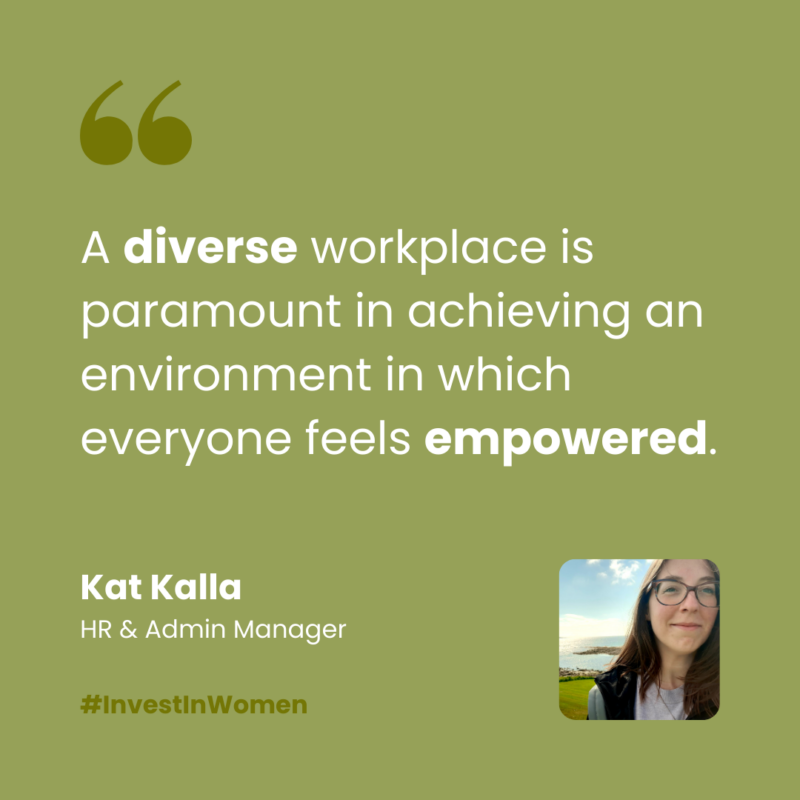
Why is it important to invest in women in the workplace?
Erin: Investing in women in the workplace is, of course, important for the same reasons it’s important to invest in all your employees. Encouraging your workforce and spending time on their growth results in a more effective team.
Beyond that, investing in women specifically can have huge benefits when it comes to accelerating growth. Unfortunately, we still live in a society that discourages women from pursuing their interests in certain fields, particularly leadership and technology. Extra investment in female employee development in these areas goes a long way to helping overcome this stigma, with extraordinary results.
Bryn: I think that making sure women are supported is key in the workplace to make sure success of individuals is reached in a meritocratic way. We all deserve a chance to succeed and making sure that imbalances of power from wider society between men and women are addressed at a workplace level is a healthy way to achieve equality.
Dan: In short, investing in women in the workplace makes good business sense!
Along with the diverse perspectives that women bring, you access a wider and highly skilled talent pool, improve understanding and responsiveness to customer needs, and create a more well-rounded work environment for a team to flourish.
Investing in the women in our team has led to innovations that were one of the primary factors contributing to our growth in 2023, in what was otherwise a difficult year for many of our partners.
Janis: Because it’s important to invest in capable employees. Aside from supporting women being a social responsibility to combat one of the biggest human rights issues – gender inequality – women are capable, and more ambitious in their careers than ever and make up a big portion of the high-skilled workforce. Investing in women not only fosters business growth but also contributes to building a sustainable environment and a healthier, more inclusive generation.
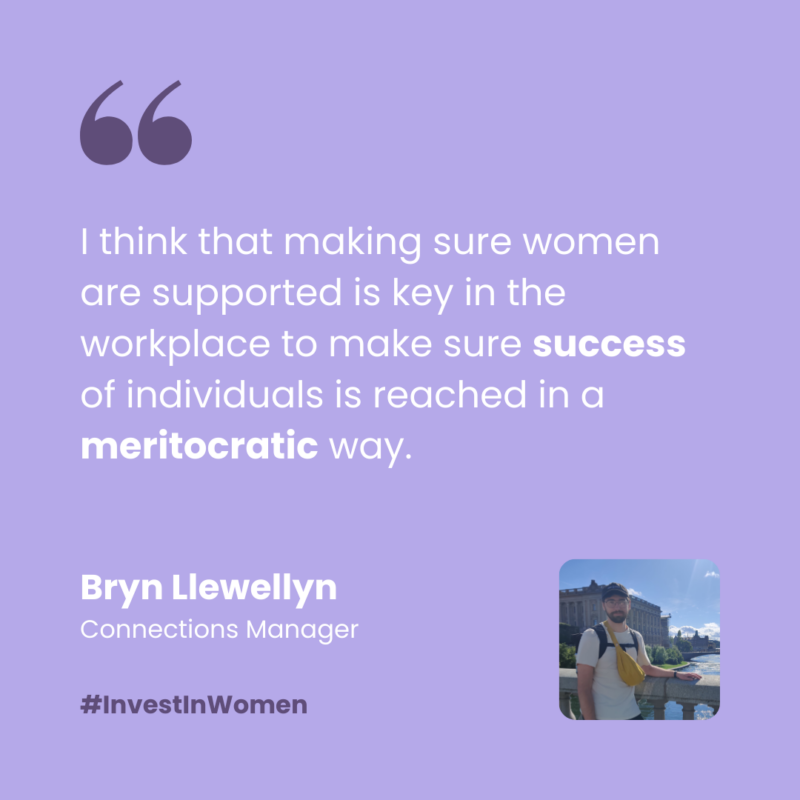
What are some things employers should consider when building an equitable workplace?
Kat: First, employers should recognise that equity is not the same as equality – equity is about ensuring everyone is rewarded and recognised for their contribution and given equal opportunities based on individual requirements. In this regard, employers should go beyond compliance with legislation and actively consider the resources and tools that individuals require to thrive within their role. This involves acknowledging that not everyone has equal access to opportunities from the outset.
I think transparency is vital – when it comes to wages, but also in terms of equity goals. A sometimes overlooked stage, but one that is very important when building an equitable workplace, is the onboarding stage. While any new employees should be provided with the same resources and materials, a “one-size-fits-all” approach won’t suffice, and employers should look to personalise any additional support during the late onboarding stage based on an individual’s needs.
Dan: Employers should consider Inclusive policies and practices, creating and then regularly revisiting HR and wider business policies to ensure we accommodate for the diverse needs of our team.
Then, they need to incorporate regular feedback and communication. Alongside sharing ideas and innovations, where they are comfortable to do so we encourage feedback and provide support for team members regarding personal experiences, to ensure not just equal opportunities, but equal outcomes are possible.
Erin: There’s a level of humility needed when building an equitable workplace in admitting that you yourself will likely have blind spots when it comes to diversity, equity and inclusion. Involving as many different voices as possible in the process of designing your DEI policies is a way to combat this. Employers should also not be afraid to read up on the subject from other sources to grow their own frame of reference.
Janis: Always listen – I think it’s hard for people to admit they might be wrong or change a mindset that is rooted so deep – but times have changed and it really isn’t about being comfortable anymore. Employees should feel they can speak up and have management stand up for them if they need support, and I think being humble and willing to learn/ unlearn goes a long way – to creating not only an equitable, inclusive workplace but also a team of loyal, dedicated talents.
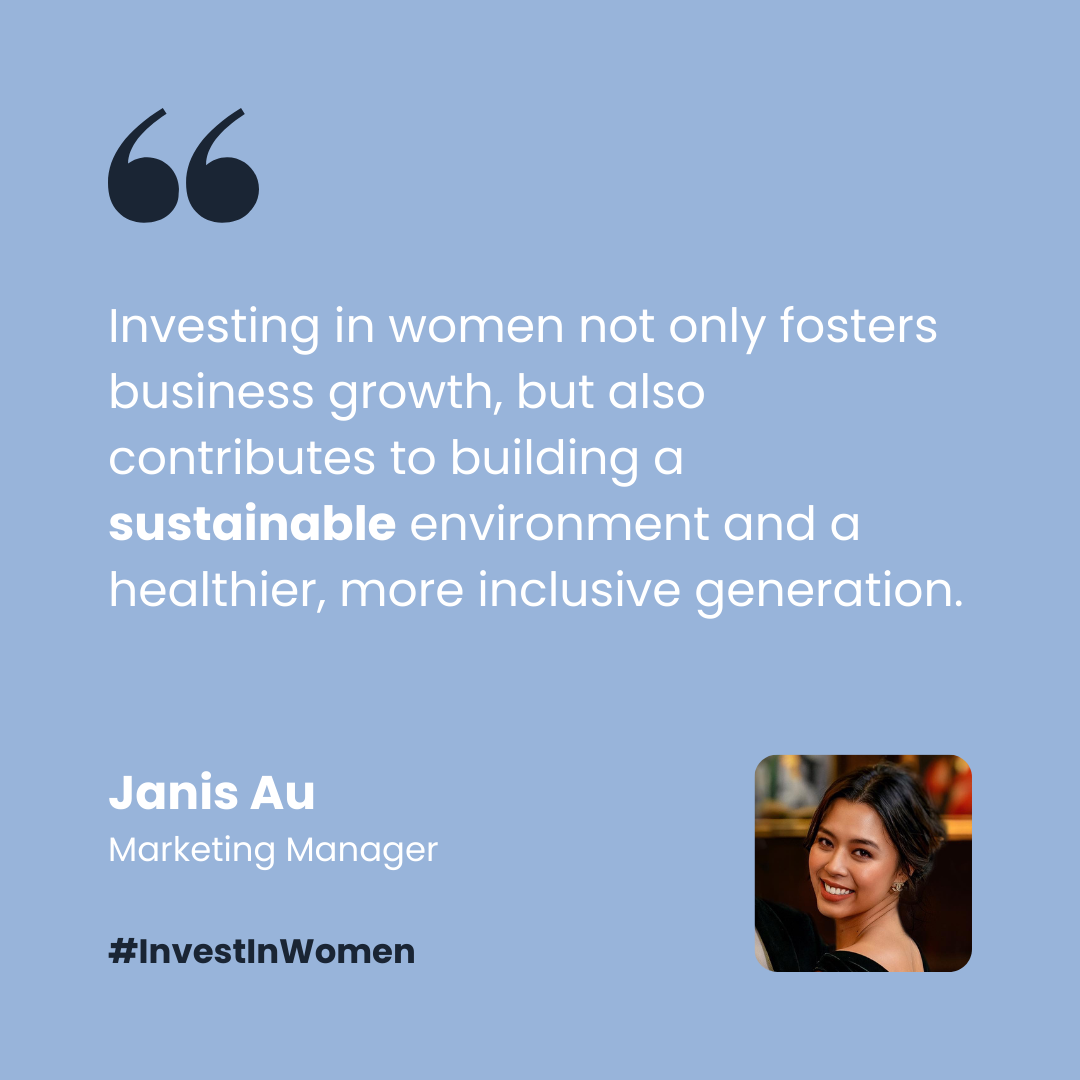
How do you think your growth as a woman has helped you in your professional role?
Kat: It has enabled me to provide (practical and emotional) support on a more personal level, contrary to the HR stereotype. As women, we’re often expected to take on multiple roles throughout our personal lives and in our careers, for instance as the role of emotional support typically falls on us. This has prepared me to perform various functions within my role and find solutions to a range of challenges.
Erin: In the years I have been with the company I’ve grown much more confident in making recommendations based on my own experiences. Trusting my own judgement has made me a much better team member and able to communicate far more effectively with out clients and partners. Women are often discouraged from speaking up, being told it’s perceived as ‘bossy’ or ‘nagging’, but I know more than ever that my professional experience and skills have value.
Rebecca: Knowing that I am supported and able to speak my mind makes me feel more comfortable while working.
Janis: I think women are generally discouraged to be loud, proud, or draws too much attention to themselves. In the past years I have learnt to speak up whenever I believe is the right thing to do, interrupt if I feel the need to – and think less of what is expected of a woman. I think it’s important for everyone to reflect if they would treat women the same way they treat men – and make small changes to unlearn habits that may be harmful to others. Growing alongside a team of supportive, incredible women also helped my person and professional growth, and I’m very thankful for them.
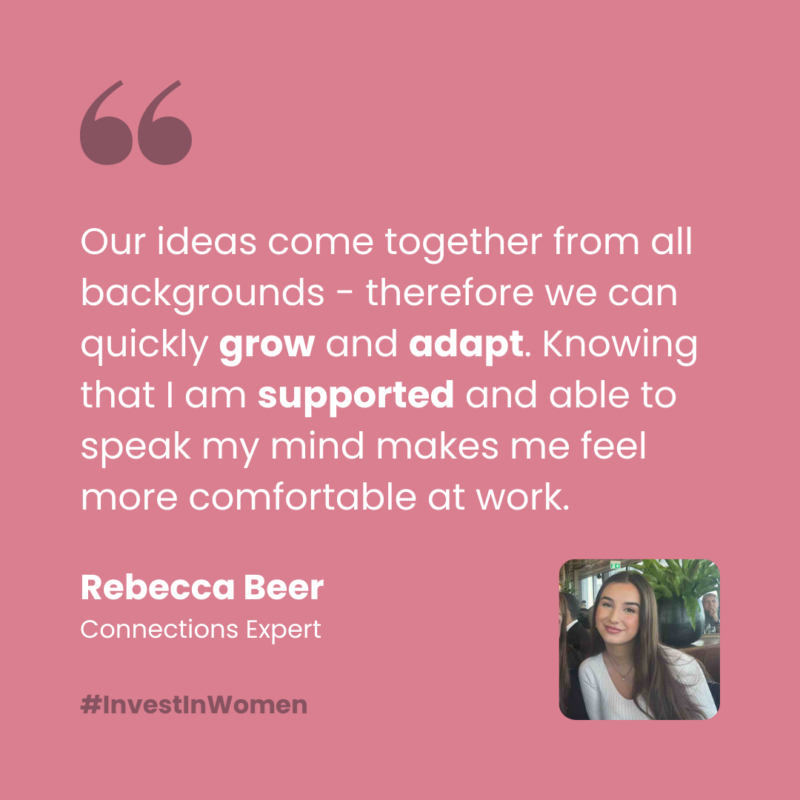
Who are your most inspirational working women?
Kat: Rosalind Franklin – her image of the first DNA x-ray led to two men (!) later being widely credited with discovering DNA.
In terms of the HR profession, a woman that I find inspiring is Claude Silver (of VaynerMedia), who has managed to successfully integrate her Psychology and Human Development background into her approach to leading and mentoring hundreds of employees. As a Psychology graduate myself, I love to see how this expertise is used in a corporate environment. Her approach involves promoting optimism and encouraging open communication between business leaders and employees – rather than rigid hierarchies – enabling employees to feel heard and motivated.
Rebecca: Working mothers. Owning a business or putting in the hours to grow in the corporate world while being expected to juggle a social life and home life. I see how hard they’re working to balance it all and it inspires me to keep reaching for the sky because there’s nothing we can’t achieve.
Erin: One of the working women I find most inspirational is Greta Gerwig. To distinguish yourself in a male-dominated field like Hollywood is impressive enough, but to reach the top of your industry without losing your individuality and flair is incredible!
Janis: I’m definitely not guilty for saying this – Taylor Swift. Not because of her catchy music which a million people claim she did not write herself, nor her vocal training that many deem “mediocre”, nor her work ethic and many self-inventions after being bullied and heavily criticised – but the positive impact she has on people, and the ways she uses her influence. She’s created a safe space for many young girls, women, men, and people of all genders to share joy, vulnerability, passion for literature; a culture where women are no longer pitted against each other, competing for attention, but raised each other up instead. That’s 2-3 generations of people healing and unlearning internalised patriarchy, and I think that’s powerful.
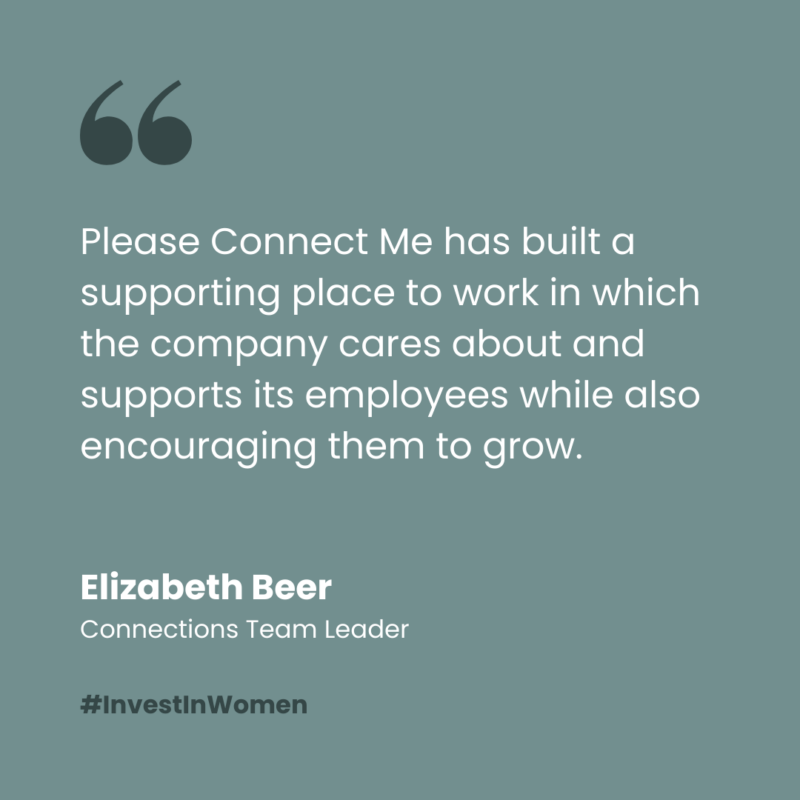
What does it mean to inspire inclusion as a leader?
Dan: Inspiring inclusion as a leader means creating an environment where every individual feels valued, respected and empowered to contribute their unique perspectives and talents. For myself and our team, this comes in many forms.
We work to set the tone by (hopefully) leading by example. I stay aware that my own actions are a reflection of the company, so the environment starts with me.
It’s also important to work at addressing bias. While there’s no room for conscious/visible bias, we also need to address unconscious bias and develop policies to overcome this.
Another pillar is encouraging communication. As a remote team, this can be a challenge but is at the core of what we want to foster in our environment. We know we’ll get the best out of our team by hearing from everyone, and aim to create channels where this is possible instantly, both within and across departments.
